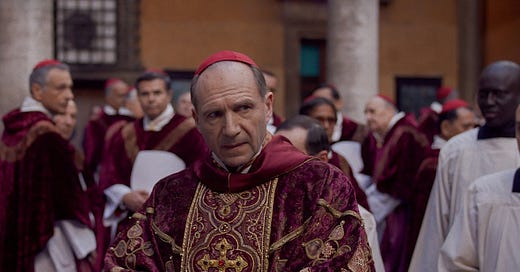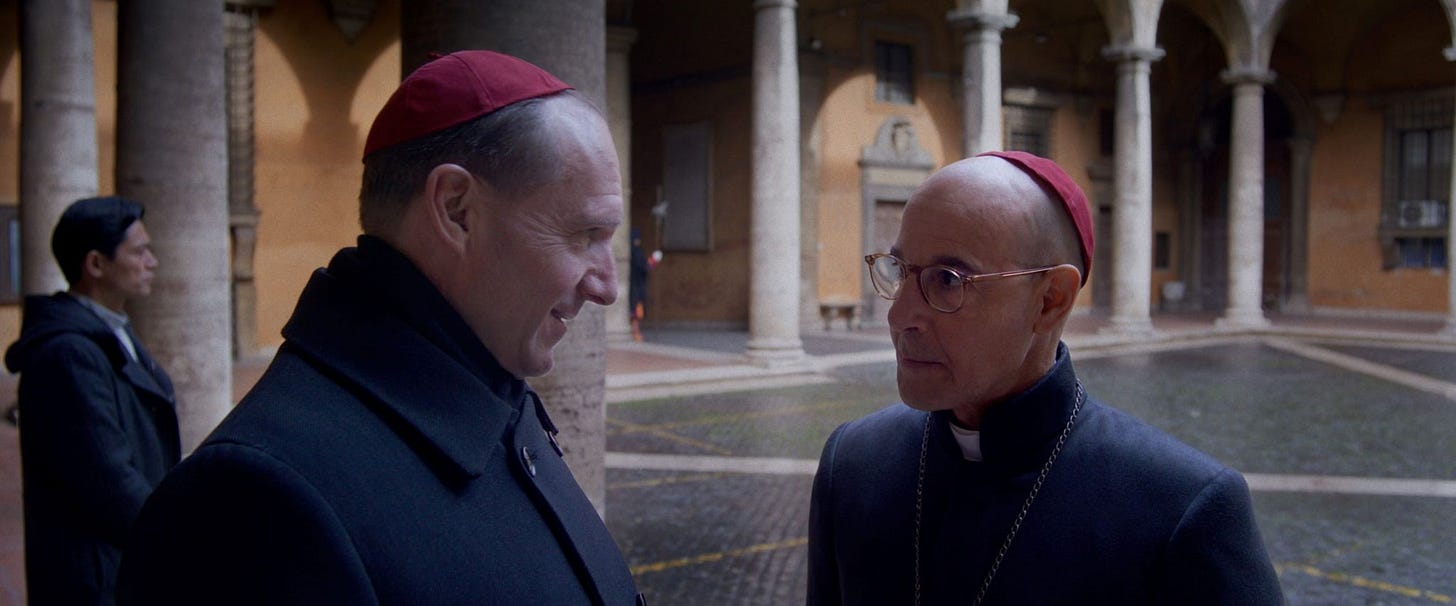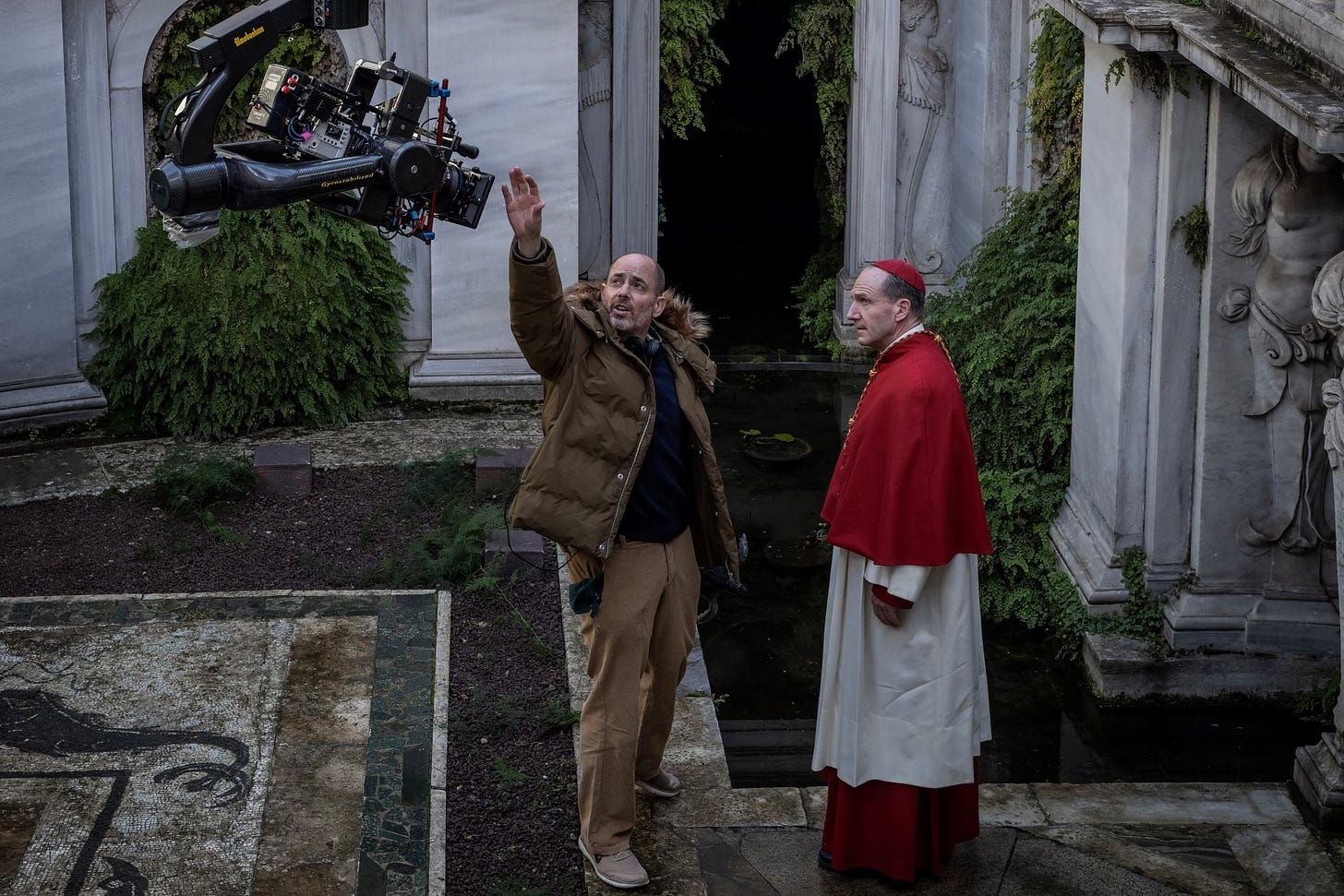Ralph Fiennes as the agonized Cardinal Lawrence mesmerizes at the movie’s cool/hot core
Conclave (2024)
In theaters
We’ve all enjoyed a locked room mystery in a venerated setting where slowly revealed clues expose a killer. Tension builds, the culprit is unmasked. Real life resolutions aren’t arrived at so tidily, but we still give out a sigh of relief. Maybe the world can make sense after all.
Conclave (adapted from Robert Harris’ 2016 novel) transposes a similar suspense to a hallowed sanctum. In the Vatican, though, the aim is to identify not a bad guy but, on the contrary, an extraordinarily good one who’s soon to be a shepherd to more than a billion souls, the Pope of Rome.
The action begins when the current progressive pope dies. The ensuing “mystery” unfolds in the minds of 118 members of the Catholic Church’s College of Cardinals. The solution they grope toward is to select one of their number to be Christ’s Deputy. No one is without sin, so the assembled men of God aren’t looking for a saint.
To guide their search, the Dean of the College, the British Cardinal Lawrence (Ralph Fiennes), must wrangle cardinals summoned from around the world to the Vatican.
The cardinals are sequestered in the living quarters of the Domus Sanctae Marthae and inside the Sistine Chapel for the voting.
Only the 118 holy men are allowed in or out of their deliberations. Selected nuns serve them their meals but play no other role. We see the cardinals eat, smoke, drink, gossip and scheme over who should sit at the pinnacle of the Church.
For any cardinal who believes he’s the man for the job, now’s the time to openly campaign. Ruthlessly, if need be. As in secular life, power isn’t bestowed without a struggle.
Who are the leading contenders? Peter Straughn's drum-tight screenplay shows them with their teeth bared, ambition gleaming in their eyes.
Cardinal Lawrence is highly thought of but wants himself placed out of consideration; he’s undergoing a crisis of faith and had asked the late pope for permission to go on a retreat to wrestle with his soul. Permission denied. The deceased pope ruled that Lawrence was a skilled manager who needed to stay on as Dean.
Cardinal Lawrence must calm his tempestuous close friend Cardinal Bellini (Stanley Tucci)
He has his hands full. The frontrunners are the American progressive Aldo Bellini (Stanley Tucci), the reactionary Venetian Goffredo Tedesco (Sergio Castellitto), the moderate Canadian Joseph Tremblay (John Lithgow), and the conservative Nigerian Joshua Adeyemi (Lucian Msamati).
Then there’s the last-minute appearance of Mexican-born Cardinal Vincent Benitez (Carlos Diehz), who explains that the late pope appointed him Archbishop of Kabul in pectore (i.e., in secret) prior to his passing.
How many Catholics are there in Afghanistan, Cardinal Lawrence and his private secretary wonder. But the deceased pope’s hidden records show that Benitez’ claim checks out.
Director Edward Berger (2022’s All Quiet on the Western Front) takes a double-edged view of these solemn proceedings. These men have a sacred task in choosing the spiritual leader of a world religion, but on the other hand, enclothed in deep crimson, they can seem like crabs in a barrel, scrambling to see who comes out on top.
Fiennes as the moral center proves a mesmerizing investigator, charged with keeping the contest clean.
To be sure, there’s brawling. Bellini believes the Church is at a crossroads and must acknowledge wickedness in its past, especially including child sexual abuse. He’s in no mood to compromise with the ultra-conservative Tedesco, who wants the Latin Mass restored and believes Islamic militancy is at the Church’s door.
Secrets swirl. It’s revealed during sequestration that inoffensive, mild-mannered Tremblay may be guilty of simony, the practice of buying or selling church offices or sacred relics. And Adayami, the Nigerian hoping to make history as the first Black pope, has long concealed a sexual indiscretion.
His secret might have remained hidden but for the exertions of a fiercely determined nun, Sister Agnes, perfectly portrayed with unblinking eyes and a steel backbone by Isabella Rossellini. She exposes the African cardinal’s misdeed, speaking up when nuns are admonished to stay silent.
The sacred and profane in conflict are most truthfully illuminated austerely, yet Stéphane Fontane’s luxuriant cinematography makes the living quarters and the interior of the Sistine Chapel feel like deluxe confinement. Apparently, wrestling with eternal questions and being comfy aren’t contradictions in the Church.
Suzie Davies’ impeccable production design gives the Church a luster, even a glamor, that seems at once invulnerable and dangerously sealed off from the teeming outside world (a violent midpoint interruption quashes that quaint notion).
The rich costumes (by Lisy Christi) and piercing light lend the double-dealing a gravity that ramps up contradictions, help us wonder why these mortal men of the cloth believe they hold actual spiritual sway.
A hard to reach two-thirds majority of the 118 votes cast is required to select a pope. As the repeated balloting keeps falling short and stretches into days — while further revelations come to light — the deciding vote remains in delicious doubt until the closing scenes.
The cut-and-thrust of determining the “best” man is shot and edited with masterly precision and bite. Beatitudes and beastliness snuggle and snarl. We feel the institution being opened up, yet it clings to its rituals, traditions and sacred past. None of that is necessarily compromised by glowering male vanity.
Director Edward Berger setting up a pivotal shot with Ralph Fiennes as Cardinal Lawrence
The shocking ending has drawn criticism, even from some who admire the movie’s look and its excellent performances. I relished the startling climax and thought it an outcome we all, religious or not, ought to consider.
No matter one’s convictions, the swift, intricately calculated writing and acting are gripping from start to finish. I’ve never seen Fiennes better. His Cardinal Lawrence keeps grappling with his own inner misgivings even as some push his name forward to be pope. The interior man and the outer conflict war across Fiennes’ face.
The man in doubt is of course just the man to cast the finest, most discriminating moral eye on the conclave (the word means a room with a key). He can look every cardinal in the eye because he’s without ambition and tells the group from the outset that he’s in need of healing, a man of doubts, not certainties.
Wanting to step away from the Church, here he’s pulled into its aching, questioning heart. His kindly, troubled eye holds the conclave and the picture together.
Tucci is not just robust as the rowdy American progressive, but his performance is filled with the kind of bristling impatience all reformers thrive on. You feel Bellini’s plea for change, but he’s not turning against the Church. Like all the cardinals here, he has a stake in the outcome, no matter who’s chosen as pontiff.
An expanded Church seems to be what Harris’ novel proposed, and the movie smartly leaves questions of reform up to the audience. A movie about a two-millennium old institution that can still be rocked, questioned, and forced to look at itself is both unexpected and thrilling.
If as you watch you sense emanations from today’s world conflicts, including the current American election, that seems intentional. No matter the institution, in order for it to survive, people have to keep believing in it.
Let’s put one powerful sanctuary to a critical test, these movie makers have decided. It’s a pleasure to see a place of privilege and power momentarily caught off guard. That the travail proves so entertaining is, well, I'll go ahead and use the word, a blessing.







An excellent, well-written review. I concur. I'd love Fiennes to win an Oscar. This is the best thriller I saw last year. :)
I greatly appreciate unexpected endings. Looking forward to this one. Great writing!